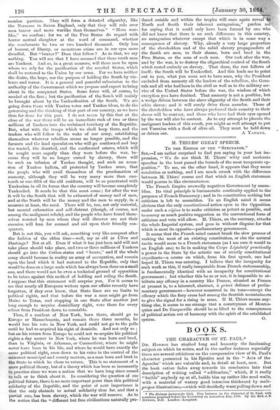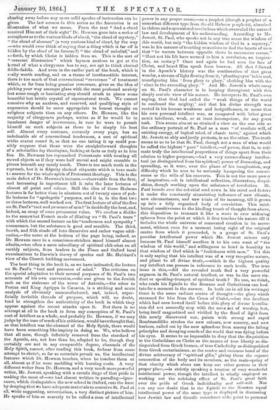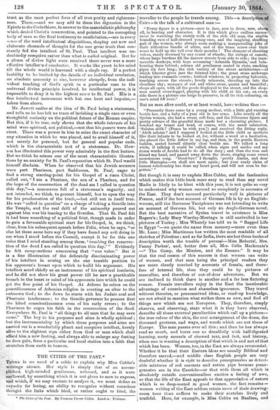BOOKS.
THE CHARACTER 01? ST. PAUL.*
DR. flowsoa has studied long and honestly the fascinating subject on which he writes, and in the earlier lectures especially there are several criticisms on the comparative view of St. Paul's character presented in his Epistles and in the "Acts of the Apostles" which are valuable and, in detail at least, new. But the book rather fades away towards its conclusion into that description of writing called "edification," which, if it really "builds" anybody up at all, builds him up rather like mud walls, with a material of watery good intention thickened by =a- propos illustrations,—which will decidedly want pulling down and • The Hulse= Leduresfor 1862. hive lectures on the character of St. Paul, with a sermon preached before the University on Ascension Day, 1863. By the ReT. 3.8. Howson, D.D. London : Longman.
clearing away before any more solid species of instruction can be given. The last sermon in this series on the Ascension is an illustration of what we mean. From the text "And a cloud received Him out of their sight" Dr. Howson goes into a series of
etaPhors as to the various kinds of cloud, "the cloud of mystery," "the cloud of absence" (a very curious kind of cloud, by the way —who would ever think of saying that a thing which is far off is hidden by the cloud of its farness ?) "the cloud of unbelief," and 133 forth, by which Christ is hidden from us. This is the sort of "reverent illustration" which laymen anxious to get at the kernel of what a clergyman has to say, are apt to think clerical fiddle-faddle. And even in the earlier part of the book, which is really worth reading, and on a theme of inexhaustible interest, there is too much of that conventional "reverence" of treatment which, so far from being genuine reverence, gives us the idea of picking your way amongst glass with the most profound anxiety lest some rough or hesitating step should crush to nieces some beautiful but brittle crystal of supernatural truth. We cannot conceive why an anxious, and reserved, and qualifying style of expression should be more appropriate to honest thought on religious subjects than on any others. Dr. Howson, like the majority of clergymen perhaps, writes as if he would be in imminent danger of irreverence, in case he were to permit himself on such subjects as these to be simply his best self. Almost every sentence, certainly every page, has an indefinable air of conventional tenderness, a sort of spiritual white cravat round it, so that no one taking it up could pos- sibly suppose that these were the straightforward thoughts of a scholarlike lay theologian, looking at facts as truly as in him lies. Dr. Newman has reproached Protestants with treating all sacred objects as if they were half unreal and might crumble to pieces beneath any manly touch. There is too much truth in the reproach, but it is fidgetty clerical etiquette which is here made to answer for the whole spirit of Protestant theology. This is the main defect of Dr. Howson's lectures,--observable from the first, and increasing in importance till it robs the later lectures of almost all point and colour. Still the idea of these Hulsean lectures is far better than in nineteen out of twenty cases of pub- lic lectures for " apologetic " purposes, and it is, in the first two or three lectures, well worked out. The first lecture of all of the five on St. Paul's "tact and presence of mind "is decidedly the best, and, indeed, an essay of some permanent value. We confess a dislike to the somewhat French mode of dilating on "St. Paul's tears" with which the second lecture on his "tenderness and sympathy" commences, but the substance is good and sensible. The third, fourth, and fifth shade off into discursive and rather vague edifi- cation,—the notes at the bottom of the page being, indeed, as Dr. Howson once in a conscience-stricken mood himself almost admits,—too often a mere miscellany of spiritual chit-chat on all earthly subjects, from leaders in the Times and Oxford local examinations to Darwin's theory of species and Mr. Hubbard's view of the Church building movement.
The best thing in the book is, as we have intimated, the lecture on St. Paul's "tact and presence of mind." The criticism on the special adaptation to their several purposes of St. Paul's two accounts of his own conversion,—the one given to the Jewish mob on the staircase of the tower of Antonia,—the other to Festus and King Agrippa in Caesarea, is a striking and acute analysis of obviously unmanufactured, and, indeed, super- ficially invisible threads of purpose, which will, no doubt, tend to strengthen the authenticity of the book in which they appear against the recent attacks upon it. But there is no attempt at all in the book to form any conception of St. Paul's cast of intellect as a whole, and probably Dr. Howson, if we may judge by the tone of much of his criticism, would have thought that, as that intellect was the channel of the Holy Spirit, there would have been something like impiety in doing so. We, who believe that all men, though infinitely removed from the standard of the Apostle, are, not less than he, adapted to be, though they certainly are not in any comparable degree, channels of the Holy Spirit, cannot, after reading this book, forbear from some attempt to sketch, so far as materials permit us, the intellectual features which Dr. Howson touches, when he tenches them at all, almost as if he were meddling with burning coals. A very different writer from Dr. Howson 5 and a very much more powerful writer, Mr. Jowett, speaking with a certain tinge of that pride in making the most of—we had almost written in parading—igno- rance, which distinguishes the new school in Oxford, cuts the knot by denying that we have adequate materials to conceive St. Paul at all, while suggesting, nevertheless, a very distinct picture of him. He speaks of him as scarcely to be called a man of intellectual power in any proper sense,—as a prophet (though a prophet of a somewhat different type from the old Hebrew prophets), absorbed in visions and supernatural revelations which overruled the natural law and development of his understanding. According to Mr. Jewett, St. Paul, who speaks not in any true sense the wisdom of this world, but only "the hidden wisdom of God in a mystery," was in his manner of teaching so anxious to find the hearts of men that "he wavers between opposite views in successive verses." "Must not his life have seemed to him a revelation, an inspira- tion, an ecstacy ? Once and again he had seen the face of Christ, and heard Him speak from heaven. All that followed in the Apostle's history was the continuation of that great wonder, a stream of light flowing from it, planting eyes ' in his soul, transfiguring him from glory to glory,' clothing him with Um
elect in the exceeding glory.'" And Mr. Jowett's whole essay on St. Paul's character is in keeping throughout with this simply ecstatic view of his nature. He interprets St. Paul's own saying, that God had called the "weak things of the world to confound the mighty," and that his divine strength was rooted in his human weakness and insignificance, to mean that his own personal intellect was, as compared with 'other great• men's intellects, weak, or at least incompetent, for any great task. This seems almost as strained a view on the one side as the ordinary portrait of St. Paul as a man "of resolute will, of untiring energy, of logical mind, of classic taste," against which Mr. Jowett so ably and justly protests, is on the other. The truth seems to us to be that St. Paul, though not a man of what would be called the highest " pure " iutellect,—of power, that is, to esti- mate truly the intellectual proportions of things apart from their relation to higher purposes,—had a very extraordinary intellec- tual (as distinguished from his spiritual) power of discussing, and spreading, as it were, over the plane of his imagination, any difficulty which he sees to be seriously hampering the consci- ences or the wills of his converts. This is not the mere power of inspiration,—it is intellectual reflection, illustration, disqui- sition, though working upon the substance of revelation. St. Paul broods over the celestial seed sown in his mind and fosters it under the constantly stimulating influence of new climate, new circumstances, and new trials of its meaning, till it grows up into a fully organized body of conviction. This intel- lectual sensitiveness to the kindling touch of thought from above, this disposition to transmit it like a wave in ever widening spheres from the point at which it first touches his nature till it includes the whole universe of renovated creation in its move- ment, without even for a moment losing sight of the original centre from which it proceeded, is a gauge of St. Paul's peculiar intellectual power which Mr. Jowett misses only because St. Paul himself ascribes it to his own want of "the wisdom of this world," and willingness to bend in humility to that wisdom of God which is "foolishness with men." Yet this is only saying that his intellect was of a very receptive nature, and pliant to all divine truth,—which is the highest quality any intellect can possess in reference to such truth. The true issue is thie,—did the revealed truth find a very powerful organon in St. Paul's natural intellect, or was he the mere via- duct or speaking-trumpet of spiritual truth ? No one, we think, who reads his Epistle to the Romans and Corinthians can hesi- tate for a moment in the answer. In both (as in all his writings) there is the same radiant centre of thought—the glory which streamed for him from the Cross of Christ,—but the intellect which had once bowed itself before this glory of divine humilia- tion did not assuredly stop with the mete act of worship, but, being itself magnetized and vivified by the flood of light from this newly discovered sun, paints with strong and rapid Rembrandtlike strokes the new colours, new scenery, and new horizon, called out by the new splendour from among the failing principles and decaying creeds of the world that was dying before his eyes. It seems to us impossible to deny that the disquisition to the Corinthians on Christ as the source of true liberty as dis- tinguished from Greek licence, of true Catholicity as distinguished from Greek sectarianisms, as the centre and common bond of the divine aristocracy of "spiritual gifts," giving them the organic connection of the body and its members, as the main-spring of that charity which alone can keep our other powers in their proper place,—is strictly speaking a treatise of very wonderful intellectual power, though the intellect is wholly employed on working out the subduing effect of St. Paul's great faith over the pride of Greek individuality and self-will. Nor cm n any one doubt that in the Epistle to the Romans equal intellectual power of the same type is displayed in discussing how Jewish law and Gentile conscience alike point to personal
trust as the most perfect form of all true purity and righteous- ness. These,—and we may add to them the digression in the Epistle to the Corinthians, in answer to the materialistic philosophy which denied Christ's resurrection, and pointed to the corrupting body of man as the final testimony to annihilation,—are in every sense of the word intellectual disquisitions, shaping out new and elaborate channels of thought for the one great truth that con- stantly fed the intellect of St. 'Paul. That intellect was un- doubtedly receptive rather than what is called original. But for a gleam of divine light once received there never was a more effective intellec'ull conductor. It works like yeast in his mind till the whole world is leavened with a single ray. If a perfect inability to b3 limited by the details of an individual revelation, an absolute necessity to rise, however abruptly, from the indi- vidual teaching of God's spirit in a particular case to the universal divine principle involved, be intellectual power, it is impossible to deny it in the highest some to St. Paul. His is a fine intellectual instrument with but one bent and impulse,— taken from above.
Mr. Jewett smiles at the idea of St. Paul being a statesman, and tells us he has left no trace of lavishing a single care or even thoughtful curiosity on the political future of the Roman empire. But this, if it be true, only shows that the whole interests of his mind were spiritual, not political,—not that his powers were defi- cient. There was a power in him to seize the exact character of any situation in which he was placed, and to avail himself of it, not merely for personal, but for general and popular ends, which is the characteristic test of a statesman. Dr. How- son has illustrated this power very admirably in the first lecture. But we think he misses one of the most characteristic illustra- tions by an anxiety for St. Paul's reputation which St. Paul would himself disclaim. When he observed that his Jewish accusers were part Pharisees, part Sadducees, St. Paul, eager to find a strong starting-point for his Gospel of a risen Christ, called out, "I am a Pharisee, the son of a Pharisee, and for the hope of the resurrection of the dead am I called in question this day,"—a manceuvre full of a statesman's sagacity, and not intended, we think, to protect himself, but to open the way for his proclamation of the truth,—but still not in itself true. He was "called in question" on a charge of taking a Gentile into the Temple, and the real drift of the animosity poured out against him was his leaning to the Gentiles. That St. Paul felt it had been something of a political feint, though made in order to gain a favourable spiritual start for his Gospel, is, we think, clear, from his subsequent speech before Felix, when he says, "or else let these same here say if they have found any evil doing in me when I stood before the Council, except it be for this one voice that I cried standing among them, 'touching the resurrec- tion of the dead I am called in question this day.'" Evidently he felt compunctious concerning that "one voice." But it is a fine illustration of the delicately discriminating power of his intellect in seizing on the one tenable position in his opponent's breast upon which to build his argument. His intellect acted chiefly as an instrument of his spiritual instincts, and he did not show his great power till he saw a practicable breach in the heart or mind of his opponents into which he could get the fine point or his Gospel. At Athens he seizes on the punctiliousness of Athenian religion in erecting an altar to the unknown God ; to the Jews he starts with his Judaic zeal and Pharisaic intolerance ; to the Gentile governor he presses first the blind conscientiousness even of his early errors ; to the Pharisees he urges his faith in the resurrection of the dead. Everywhere St. Paul is "all things to all men that he may save some." The key to his purposes and aims is wholly spiritual ; but the instrumentality by which these purposes and aims are carried out is a wonderfully pliant and receptive intellect, keenly alive to the slightest sign either from God or man which shall afford him a new footing, and always able to enlarge any footing he does gain, from a particular and local station into a faith that stretches from earth to heaven.
































 Previous page
Previous page